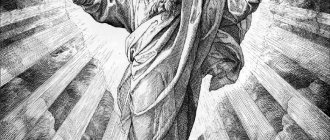John 8:58 and Jehovah's Witnesses
“Jesus said to them, ‘Truly, truly, I say to you, before Abraham came into being, I already was.’” (John 8:58, New World Translation).
Jehovah's Witnesses deny that Jesus is God. Therefore, when it comes to translating and interpreting Scriptures that testify to the divinity of Jesus, the Watchtower Bible and Tract Society goes to great lengths to justify their false preconceptions.
They translate individual verses according to their beliefs. One such verse is John. 8:58.
The Bible of Jehovah's Witnesses, known as the New World Translation (NWT), deliberately translates this verse to suit their theology. Below we present the same verse in the Synodal translation in its context.
“Your father Abraham rejoiced to see My day; and he saw and rejoiced. 57 At this the Jews said to Him: You are not yet fifty years old, and have You seen Abraham? 58 Jesus said to them, “Truly, truly, I say to you, before Abraham was, I am.” 59 Then they took stones to throw at Him; but Jesus hid himself and left the temple, passing through the midst of them, and went on further” (John 8:56-59).
The subject matter is the expression “I am” in verse 58.
Jehovah's Witnesses "translated" the Greek present tense ("I am") into the past tense ("I already was"), since this is consistent with their theological belief that denies the Incarnation of God in the person of Jesus.
The Greek text says " ego eimi ", which literally means "I am."
The expression “ego eimi” is in the present tense (I am) and not in the past tense (I was). The natural and accurate translation seems to be “I am.” Then why doesn’t PNM translate the present tense into the present tense? Why?!
I am firmly convinced that there is only one reason for this: the expression “I am” in John. 8:58 actually identifies Jesus with God, for in Ex. 3:14 God called Himself by the name “I Am Who I Am.” This is why the Watchtower Bible and Tract Society has chosen to translate this expression differently.
“God said to Moses: I AM AM. And he said, “Thus you shall say to the children of Israel: Jehovah [Jehovah] has sent me to you” (Exodus 3:14).
However, this question is not so easily resolved, because the expression "ego emi" in other places in the Bible is sometimes rightly translated other than "I am."
Ego eimi
I am John.
8:58 and Jehovah's Witnesses For example, in the NASB English translation of John. 14:8-9 in the sentence “I have been with you so long and you do not know Me, Philip?” the words "ego eimi" (I am [with you]) are translated using the perfect ('Have I been so long with you, and yet you have not come to know Me, Philip?).
This translation of the expression “ego eimi” with the perfect in the NASB at first glance seems similar to the translation of John. 8:58 in the English version of the PNM (“Before Abraham was I have been”). But we need to understand why the English NASB translators used John in their translation. 14:8-9 perfect “I have been”, and did not translate this sentence into the present tense, like the Russian Bible translators: “I have been with you so long, and you do not know Me, Philip?”
The answer is quite clear: if they translated “ego eimi” in this sentence into English “I am” (“I am”), then such a construction of the sentence (“I am with you so long....”) would be unnatural for English speech.
In English, when talking about an action that began in the past and continues to the present, the perfect form is used. That’s why the NASB English translation says “Have I been so long with you...” (literally: Was [and am] Am I with you all this time...)
In such cases, the use of the perfect is permissible and even necessary to make it easier for the reader to read and perceive the English text. But should we use the perfect in Jn. 8:58? I do not think so. Only a prejudicial denial of Jesus as God in the flesh can be the reason for such a translation choice.
In addition to this, the issue is further complicated by the fact that in some other translations of the Bible, “ego eimi” in Jn. 8:58 also does not translate as “I AM.”
For example:
- in the translation by priest Leonid Lutkovsky (1990), the words of Jesus are translated as follows: “I was before Abraham was born.”
- in the translation “Word of Life” it also says “I have already been.”
Therefore, Jehovah's Witnesses will tell you that the PNM is not an inaccurate translation at all. After all, in other translations of the Bible these words of Jesus are translated not “I AM”, but “I was.” But such translations are known to treat the Greek text more freely, while the King James Version is more literal, like the English KJV (King James Bible), which translates these words with the phrase “I AM.”
In fact, the vast majority of translations of the New Testament into various languages around the world translate this verse literally “I am” or “I am.”
Below are some examples:
- “Jesus said to them, “Truly, truly, I say to you, before Abraham was, I am.” (New Testament. Translated by Bishop Cassian)
- “Jesus answered: “Truly I say, even before Abraham was, I am the One who is!” (The Bible. Modern translation)
- “Isa said: “I tell you the truth, even before Ibrahim was born, I AM.” (Holy Scripture. Eastern translation)
- "Jesus affirmed, 'I tell you the truth, before Abraham was born, 'I already was, and 'I AM.'" (New Testament in modern Russian translation / Translation and notes edited by M. P. Kulakov)
- “Jesus said to them: Truly, truly, I tell you: First, first Abraham, I am.” (Ukrainian translation by I. Ogienko)
- English translations – “I am” means “I am”: “Verily, verily, I say unto you, Before Abraham was born, I am,” (ASV).
- “Verily, verily, I say unto you, Before Abraham was, I am,” (KJV).
- “Truly, truly, I say to you, before Abraham was born, I am,” (NASB).
- “I tell you the truth,” Jesus answered, “before Abraham was born, I am!” (NIV).
- “Most assuredly, I say to you, before Abraham was, I AM,” (NKJV).
- “Truly, truly, I say to you, before Abraham was, I am,” (RSV).
- “Truly, truly, before Abraham was, I am,” (NLT).
- “Truly, truly, I say to you, before Abraham was, I am,” (RSV)
- “Verily, verily I say unto you, before Abraham was, I am!” (KJ21) .
- “Verily, verily, I say to you, Before Abraham's coming - I am,' (YLT) .
- “Verily, verily, I say unto you, Before Abraham was, I am,” (Darby).
- "Antes que Abraham fuese, yo soy,"
- "En vérité, en vérité, je vous le dis, avant qu'Abraham fût, je suis,"
Of course, Jehovah's Witnesses will refer to translations in which this expression is not translated “I am” and on this basis will prove their case. It is a pity, but due to many different translations, this dispute between Jehovah's Witnesses and Christian apologists will not end until the coming of the Lord.
Watch tower
We turn now to the Watchtower Bible and Tract Society's Greek Interlinear Edition, published in 1969. On page 467 the following is noted:
In the interlinear translation of the Watchtower itself, the last words of John. 8:58 is translated as “I am” (I am), although the PNM says “I have already been” (I have been).
Related article: Jehovah - translation error.
Thus, Jehovah's Witnesses recognize that the Greek text says "I am" in the present tense. They don't deny it. But they assume that this expression should be translated in English by the perfect “I have been” (and in Russian “I have already been”).
But should and can it be translated this way? If so, then most Greek scholars would agree with PNM's translation choice. But they don't agree.
In essence, the Watchtower organization claims that all translations that say "I am" are inaccurate, and the "correct" translation of this passage is only "I was."
On page 467 of the PNM translation in a footnote to John. 8:58 it is written: “I have been (I have already been) = “ego eimi” after the infinitive phrase with the aorist “prin' Abraham genestai”, and therefore it should be translated with the perfect. This is not exactly the same as “ho he” (“I am” or “I am”) in Ex. 3:14 LXX translation.”
The "LXX" translation is the Seputaginta, a Greek translation of the Old Testament from the Hebrew language.
The question is whether Jesus was quoting the Septuagint or whether He was simply translating from the Hebrew.
In Ex. 3:14 says, “God said to Moses, “I am who I am.” And he said, Thus shall you say to the children of Israel: Jehovah [Jehovah] has sent me to you.” The expression “I am who I am” in the Greek translation of the LXX is literally: “Ego eimi ho on,” that is, “I am He Most.”
In most Bibles these words in Ex. 3:14 translated directly from the Hebrew text as "I am" in the present tense; This is exactly what the Jewish translators of the Septuagint did.
In the LXX translation, these words are also in the present tense, in accordance with the syntax of the Greek language. Likewise, the words of Jesus in John. 8:58 is also expressed in the present tense.
Despite the fact that in a number of other translations of the New Testament, “ego eimi” in Jn. 8:58 is also translated using the past tense form, I believe that the PNM version is unacceptable for three reasons:
- First, Jehovah's Witnesses state that their goal is “to convey His [God's] thoughts and statements as accurately as possible.” I do not believe in that. Because I see the Watchtower's bias against the Deity of Christ not only in this verse, but also in other Scriptures they have mistranslated, such as Heb. 1:8 and Col. 1:15-17.
- Secondly, in the most literal translations, such as the Russian Synodal Version or the English translations of the NIV and KJV, this expression is translated not “I was,” but “I AM.”
- And third, the context of this verse does not support the position of Jehovah's Witnesses.
It was not the English or Russian translation that angered the Pharisees, but the Greek words
“Your father Abraham rejoiced to see My day; and he saw and rejoiced. 57 At this the Jews said to Him: You are not yet fifty years old, and have You seen Abraham? 58 Jesus said to them, “Truly, truly, I say to you, before Abraham was, I am.” 59 Then they took stones to throw at Him; but Jesus hid himself and left the temple, passing through the midst of them, and went on further” (John 8:56-59).
The Pharisees spoke neither Russian nor English. They spoke Hebrew and Greek. In the Greek text, Jesus uses the present tense. It was precisely this present tense (I am) that angered the Pharisees; they were not angry by the English perfect (I have been) or the Russian past tense (I was).
If in this conversation with the Jews Jesus actually told them “I was,” then why did they want to kill Him (v. 59)?
Related article: The Name of God in the Bible. More than 55 options.
We know that a man who called himself God was considered a blasphemer and deserved death. Is it not clear that in this case Jesus said about Himself “I am”, and the Jews understood His words in this sense? This is absolutely clear!
Therefore, the best translation of this expression is “I am.”
In this connection it should also be noted that in Mar. 14:62 Jesus answered the high priest’s question, “Are you the Christ, the Son of the Blessed One?” in the following way:
"I; and you will see the Son of Man sitting at the right hand of power and coming on the clouds of heaven. Then the high priest tore his clothes and said, “What more need do we have for witnesses?” You heard the blasphemy..."
Jesus literally responded, “I am,” and this is what caused such an angry reaction from the leaders of the people and led them to seriously decide to put Jesus to death.
This is further confirmed when compared with John. 10:34, where the Pharisees wanted to kill Jesus because He was making Himself equal with God. In this context, the words “I AM” in the mouth of Jesus, of course, become even more understandable.
Without a doubt, Jesus knew the difference between the Greek expressions “I am” and “I was.” He used the form “I am” in Greek, not “I was.”
It was not the English or Russian translation that angered the Pharisees, but Jesus' statement in Greek.
But the Pharisees were terribly angry
In this part of the conversation, many Jehovah's Witnesses begin to say that when Jesus said “Before Abraham came, I already was” (BE), the Jews were already terribly angry with Jesus, and, in fact, these His words became just another reason for their evil plans.
Jehovah's Witnesses deny that Jesus called Himself by the name of God, which God told Moses in Exod. 3:14: “I am who I am.” And yet let us think about which words of Jesus could have angered the Pharisees more: “Before Abraham was, I am,” or “Before Abraham was, I already was”?
Obviously, the first phrase would have angered them more, and therefore the first phrase should be considered an accurate translation.
If Jesus wanted to avoid misunderstandings, why didn't He make things "clearer" by using the past tense? He certainly understood that the words “Before Abraham was, I am” would be received with hostility by the Pharisees. And so it happened.
The aorist (I was), the perfect (I have already been), and the past perfect (I have already been) are all connected with the past, but Jesus deliberately chose the present tense form “I am.” He spoke about Abraham in the past tense (“Before Abraham was...”), and about Himself in the present tense (“I am”). He deliberately placed the words “I am” in the center of attention. The Pharisees understood this, which filled their cup of patience.
Duse Franklin Rutherford became the main teacher of Jehovahism
, who was born in Boonville (Missouri). He was first a lawyer for the US Supreme Court, later became a judge, and from 1907 - legal adviser to the Tower Society in Brooklyn (New York). In 1917, he achieved election to the post of president of the society. Ruthenfort's opponents reproached him for "adopting some ideas from the teachings of Roussel, but soon discarded most of them and began to propagate his own ideas, most of them unbiblical, radical and extreme." Resistance by some groups against Rutterford led to a crisis and numerous divisions; associations of free Bible researchers were formed: the “Free Bible Community” with its center in Kirchengen (Westphalia); the consolidation of Morning Bible Studies with a center in East Rutherford, New Jersey, and a Freiburg office for Germany; "Domestic World Missionary Movement" centered in Philadelphia. At the Cedar Point (Ohio) convention in 1919, Rutherford led the reorganization of the movement, which was threatened by divisions. In subsequent years, he propagated his teaching, which differed significantly from the teaching of Roussel, overcoming all resistance in a dictatorial manner, and thus building a clearly organized religious society.
The “International Association of Serious Bible Students” at a congress in Columbia (Ohio) on July 26, 1931 adopted the name “Jehovah’s Witnesses” (Is. 43:10-12) and later supplemented it with the definition of “Theocratic Organization” and “New World Society”. In 1933, the reform of the organization with centralized management ended. Each local congregation was required to sign a resolution agreeing that "the society is the visible representative of God on earth," so the Brooklyn society was invested with general authority to preside over all organizations, and the Tower Society was recognized as the sole authority as " instruments of Jehovah." When Rutherford died in January 1942, he was succeeded as president of Jehovah's Witnesses by Nathan Homer Knorr. He was born in Bethlehem (Pennsylvania, USA) on April 23, 1905. In 1921 he transferred from the Reformed Church to Jehovah's Witnesses and worked in their central body. There are now three societies: the first "Tower, Bible and Tract Society" in Pittsburgh (Pennsylvania), founded in 1881 for work abroad; second: the Tower Bible and Tract Society in Brooklyn (New York), founded in 1909 to work in the USA; third: the International Bible Students Association, founded in 1914 in England to work in the British Isles. The chief representative of the general work of Jehovah's Witnesses is the Tower Bible and Tract Society of Brooklyn. The central office in Brooklyn offers detailed doctrine and mandatory procedure, and does not tolerate the slightest resistance. In 1965, the total number of assemblies in 197 countries was 24,157 and they were subordinate to 92 bureaus. Each Jehovah's Witness, according to their treatise, “is a preacher of the Gospel. One who does not preach the good news in the example and image of Christ
, is not a Jehovah's Witness." But the gospel of Jehovah's Witnesses is “the good news of the establishment (in 1914) of the Kingdom.” This is “another gospel,” not the New Testament. The Apostle Paul says: “I am amazed that you are so quickly moving from Him who called you by the grace of Christ to another gospel, which, however, is not another, but there are only people who are confusing you and want to change the gospel of Christ. But if we, or an angel from heaven, preach to you a gospel other than what we preached to you, let him be accursed” (Gal. 6-8). Jehovah's Witnesses do not have passive membership. Each Jehovah's Witness is required to spend 15 to 20 or more hours a month in “field service” as a “mouthpiece.” Each member reports monthly to his congregation on his activities, field hours spent, the amount of literature he has distributed, and the number of visits he has made to study Jehovah's Witness literature at home. Based on the reports of the members, the meeting compiles a report for the industry bureau, which sends its report to the main 6 bureau in Brooklyn. There, the reports received there are evaluated and the necessary conclusions are drawn from them.
The proclamation of the kingdom in the concept of “Jehovah's Witnesses” is also served by the printed organ “Tower” of the Bible and Tract Society, which is published in 164 languages. The Watchtower first appeared in 1965 in 66 languages, and Awake! - in 25 languages. Jehovah's Witnesses also use radio, television and film for their work.
Who are Jehovah's Witnesses and what are the features of their teaching and what do they teach?










